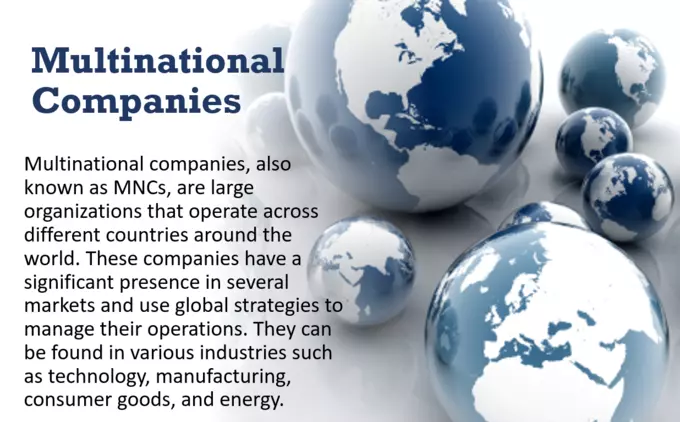Table of Content:-
- Meaning of Multinational Companies
- Definition of Multinational Companies
- Need of Companies Becoming Multinational
Meaning of Multinational Companies (MNCs)
Multinational companies are those companies that manufacture and market the products or services worldwide.
Generally, multinational companies operate, manufacture and market products or services in their home country, as well as in other countries around the world. The corporation has its headquarters located in one country and operates wholly or partially owned subsidiaries in other countries.
The multinational corporation came into existence in the early 1860s, it was after World War II that the multinationals were overgrown. The first MNC came to India in the year 1921. In the early days, the United States was the home of most MNCs. Now there are several European and Japanese multinationals. Multinationals have been emerging from developing countries too.
Definition of Multinational Companies
A multinational corporation has been defined as follows: “An enterprise which allocates company resources without regards to national frontiers, but is nationally based in terms of ownership and top management.”
“An enterprise which owns or controls production or service facilities outside the country in which they are based.”
According to James C. Baker a multinational corporation is a company
1) Which has a direct investment base in several nations,
2) Generally derives from 20% to 50% or more of its net profits from foreign operations, and
3) Whose management makes policy decisions based on the alternatives available anywhere across the globe?
It is an enterprise, which effectively allocates company resources on a global scale without regard to national borders, yet is rooted in national ownership and top
It comprises three words multi, national and corporations. These words together mean that corporations which have established their offices increase the interaction either through their efforts or by collaborations with other companies.
Related Articles:
- nature of business meaning
- nature of international business
- scope of international marketing
- determinants of economic development
- nature of capital budgeting
- nature of international marketing
It took lots of time for Indian companies to expand themselves globally and become multinational companies (MNCs). As time passed India acquired many companies abroad, recruited many people outside India, and became world world-famous supplier. India Inc. is flying high. Not only over the Indian sky. Many Indian firms have slowly and surely embarked on the global path which leads to the emergence of Indian multinational companies. India is a democratic, multicultural society. Many international companies are there in India which connects it to the rest of the world. The expansion of several companies, such as the Tata Group and Mittal Steels, shows the emergence of Indian multinationals.
Need of Companies Becoming Multinational
In today’s globalized world, Indian companies must expand their businesses across borders and become multinationals. The factors below explain the need for being multinational.
- Factor Mobility
- Economic Reforms
- Management Culture
- Growth Urge
- Market Potential
- Risk Minimising
- Development in Communication Technology
1) Factor Mobility
The movement of goods, capital, labour, technology and management across borders has paved the way for the growth of multinational corporations (MNCs) around the globe. International and economic cooperation has boosted the worldwide flow of factors, making it easier for companies to expand globally.
2) Economic Reforms
Governments of most developing and underdeveloped economies are facing problems with their public sector and bureaucracy, resulting in poor GDP rates, poverty, and unemployment. To bring back their economies on track, governments have made several economic reforms, including globalization, which has opened their economies to international companies.
3) Management Culture
MNCs generally adjust their operations according to local conditions between parent and subsidiary in a coordinated federation. Decisions on investment financing and the market are localized, and corporate strategic planning is important for enhanced integration and coordination of MNC’s global activities. Whereas, subsidiary-level strategic planning is directed towards localizing the global strategy according to the peculiarities of local conditions. This autonomous adoption of fast-changing local business environments is the main reason for the growth of MNCs.
4) Growth Urge
Generally, MNCs have a growth momentum with them. They adopt diverse strategies, such as joint ventures, strategic alliances, wholly-owned subsidiaries, acquisitions, mergers, franchising, etc., to exploit global opportunities and expand their businesses globally. Becoming a multinational corporation is important for Indian companies to remain competitive in the global market. By expanding their functions beyond their borders, they can take advantage of opportunities and secure their place in the global market.
The motives for such expansions are:
i) Development of technology or brand recognition leading to global demand met through overseas investment
ii) Securing supplies of minerals, energy and scarce raw materials.
iii) Availability of cheaper factors of production overseas, strategic use of their operations and spreading business the MNCs have the technology and competitive edge geographically.
Global expansion is a very simple process for multinational corporations (MNCs) until and unless certain countries or states purposefully block their entry. The key factor in this process is the MNCs’ desire to pursue and incorporate marketing, manufacturing, research and development, and financial opportunities on a global level, rather than limiting themselves to domestic markets.
5) Market Potential
Multinational corporations keep an eye on the international market and always look out for new markets to expand their reach. The allure of increasing market potential is a great attraction for most MNCs. Prominent MNCs such as IBM, Unilever, Coca-Cola, and Philips are among those who actively seek out these opportunities. As the global economy evolves, MNCs recognise the importance of diversifying their functions and tapping into new markets.
6) Risk Minimising
Several agencies contributed to the growth of multinational corporations dedicated to reducing country risk. In today’s global economy, multinational corporations (MNCs) face many risks when expanding into new markets. These risks may be political instability, economic uncertainty, or cultural differences. To reduce these risks, many agencies have emerged to help MNCs navigate the complexities of accomplishing business in foreign countries.
7) Development in Communication Technology
The IT industry has undergone a considerable transformation, resulting in rapid communication around the globe. Effective communication is the lifeline of successful business management, and technological advancements in this field have removed national boundaries, making the world a global village.

You may also like:-
Reasons for International Business
Nature of International Business
Major Reasons for International Business
Factors Affecting International Business
Modes of Entry into International Business
Importance of International Business
Difference between Domestic and International Business
Complexities of International Business
Importance of International Business Environment
Components of International Business Environment
Impact of Globalisation on International Business
Determinants of Economic Development
